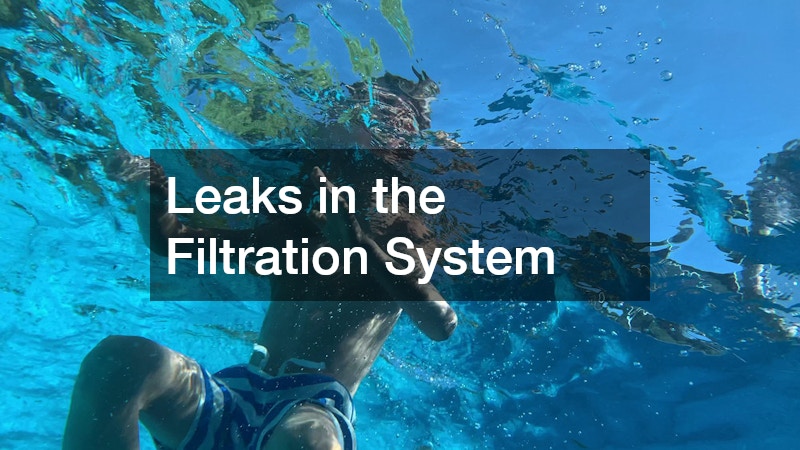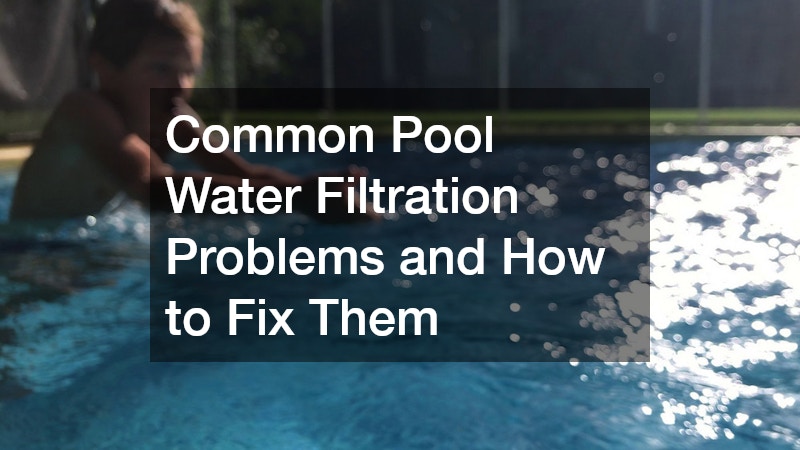A properly functioning pool filter is the heart of a clean, safe, and inviting swimming pool. Without effective filtration, debris, dirt, and harmful microorganisms can accumulate, making your pool water cloudy, unsanitary, and unappealing. However, your pool water filtration system is not immune to problems. From clogged filters to low water flow, issues can arise that affect both the efficiency and longevity of your pool system.
Understanding common pool filtration problems—and knowing how to address them—can save you time, money, and frustration.
Clogged or Dirty Filters
One of the most common issues pool owners face is a clogged or dirty filter. Over time, sand, cartridge, or diatomaceous earth (DE) filters accumulate dirt, leaves, hair, and other debris. A clogged filter reduces water flow, decreases filtration efficiency, and can place unnecessary strain on your pool pump.
How to Fix It:
-
Sand Filters: Backwash the filter according to manufacturer guidelines to remove trapped debris. This process reverses water flow through the sand, flushing out contaminants.
-
Cartridge Filters: Remove the cartridge and hose it down thoroughly. If buildup is stubborn, soak it in a filter-cleaning solution to remove oils and minerals. Replace cartridges every few years or as needed.
-
DE Filters: Backwash the filter to remove old DE powder, then add fresh DE as recommended. Check grids or fingers for wear or damage and replace them if necessary.
Regular inspection and cleaning prevent clogging and maintain optimal filtration efficiency.
Low Water Flow
Low water flow is a clear sign that something is wrong with your pool filtration system. Reduced circulation can lead to cloudy water, uneven chemical distribution, and strain on the pump.
Possible Causes and Solutions:
-
Clogged Skimmer or Pump Basket: Remove debris from the skimmer and pump baskets. Even small leaves can obstruct water flow.
-
Dirty or Clogged Filter: Clean or backwash your filter to restore proper water flow.
-
Air Leaks in the Pump System: Check pump lid gaskets and plumbing connections for air leaks, which reduce suction and flow. Tighten or replace parts as needed.
-
Blocked or Kinked Plumbing: Inspect the plumbing lines for blockages, sharp bends, or damage that could restrict water flow.
Maintaining proper water flow is critical for both filtration performance and pump longevity.
Cloudy Pool Water
Cloudy water is not just unattractive; it’s a sign that your filtration system isn’t effectively removing particles and contaminants. While cloudy water can result from chemical imbalances, filtration problems are often the main culprit.
How to Fix It:
-
Check the Filter: Ensure your filter is clean and functioning correctly. Backwash or replace the filter medium if necessary.
-
Monitor Pump Run Time: Make sure your pump runs long enough each day to circulate all the water through the filter. Most pools require 8–12 hours of circulation daily.
-
Shock the Pool: If cloudiness persists, a pool shock treatment can remove organic contaminants and restore clarity.
Routine filter maintenance combined with proper chemical balance ensures crystal-clear water.
Air in the Filter or Pump
Air in the pump or filter system can reduce water circulation, cause noisy operation, and eventually damage the pump. This problem often presents as bubbles in the return lines or a drop in pump pressure.
Causes and Solutions:
-
Low Water Level: Ensure the water level in your pool is high enough for proper skimmer operation.
-
Leaky Pump Lid or O-rings: Inspect the pump lid, gaskets, and seals for wear or cracks. Replace as needed.
-
Cracked Plumbing: Examine suction lines for leaks and repair any damaged pipes or fittings.
Addressing air leaks promptly protects your pool water filtration system and maintains efficient operation.
Filter Pressure Issues
Your pool filter has a pressure gauge that indicates the system’s performance. High or low pressure readings can signal filtration problems.
High Pressure: Often caused by a dirty or clogged filter. Backwash, clean, or replace the filter medium to reduce pressure.
Low Pressure: Typically indicates low water flow due to air leaks, pump issues, or clogged suction lines. Inspect your system carefully and address the underlying cause.
Monitoring filter pressure regularly helps detect problems early and prevents damage to your pump and filter system.

Leaks in the Filtration System
Leaks in the pool water filtration system can occur in pumps, valves, pipes, or the filter itself. Leaks reduce water efficiency, waste chemicals, and can cause long-term damage if left unaddressed.
How to Fix It:
-
Visual Inspection: Check around the filter tank, pump, valves, and plumbing connections for visible signs of water leakage.
-
Tighten Connections: Many leaks can be fixed by tightening clamps, fittings, or unions.
-
Replace Damaged Components: For cracked tanks, damaged O-rings, or worn gaskets, replacement is usually the safest option.
Regular inspections and timely repairs prevent leaks from escalating into costly problems.
Noisy Pump or Filter Operation
Strange noises from your filtration system are usually a warning sign. Grinding, squealing, or rattling can indicate mechanical issues.
Common Causes and Solutions:
-
Cavitation: Low water levels or suction leaks can cause the pump to cavitate. Check water levels and fix any leaks.
-
Worn Bearings: Bearings in pumps can wear out over time. Lubricate or replace as needed.
-
Debris in Pump Impeller: Turn off the pump and inspect the impeller for leaves, hair, or other debris.
Ignoring unusual noises can lead to pump failure, so it’s essential to address them promptly.
Preventative Tips for Maintaining Your Pool Filter
-
Run your pool pump daily for adequate circulation.
-
Backwash or clean filters according to manufacturer recommendations.
-
Inspect pumps, valves, and plumbing for leaks or damage.
-
Monitor filter pressure gauges and take action when readings are abnormal.
-
Maintain proper chemical balance to reduce strain on your filtration system.
By combining regular maintenance with attentive monitoring, you can avoid many common pool filtration problems and keep your water clean, clear, and inviting all season long.
